Note
im trying to ask all different kids of accounts bc i can't get one solid answer - how would u specifically define zionist? do you think the people who are currently israelis (and are not west bank settlers, may they all be tried for their crimes) should be able to live in a decolonized palestine?
I had to take a couple of days mostly because I was trying to find a single concise answer for you in a citation. Before I give you a definition of a Zionist, I must first describe what Zionism and it's implications are. Here is Ismail Zayid's "Zionism, the myth and the reality" (click).
The very first couple of paragraphs of the book, he says:
Zionism, as a modern political creed, grew in close association with three interacting major forces which exercised a profound influence on the character and nature of the Zionist movement, resulting in three basic qualities characterizing this movement, namely: settler colonialism, expansionism and racism.
The first of the three major forces was the growth, in the nineteenth century, of European colonialism and imperialism and the expansion of the colonial settler regimes.
The alliance made between Zionism and European colonialism is clearly attested to by both sides, identifying reciprocal benefits in the alliance. Herzl, in his "Der Judenstat," expressed clearly both the racist nature of Zionism as well as its role as a settler colonial outpost:
"We should, there, form a portion of the rampart of Europe against Asia, an outpost of civilization as opposed to barbarism. We should, as a neutral state, remain in contact with all Europe, which would have to guarantee our existence."
There's more in the book that I can't type up lol, but in essence a Zionist subscribes to the idea of Zionism itself, and insists on the establishment of a settler colonial entity whether passively or actively.
Zionism is a settler colonialist movement, as stated by the founder of the movement for Zionism, Theodore Herzel (quoted above in the smalltext). It modeled itself after much of the European colonialist strategies, enforcing borders and nationalities on a previously border-lose world. I mention the making of borders as a fundamental part of colonialism because by rejection of those borders as a concept, we start to imagine the world in a post-colonial universe. Sherene Seikaly makes this point in her book "Men of Capital" in the introductory chapter:
But in such a search, it is almost inevitable that nationalism—its “lack,” its “strength,” or its “weakness”—will stand as a metonym for politics. In some renditions, the weakness of normative nationalism—a “political deficiency” and a lack of a national “spirit”—resulted in, as the leading historian of collaboration continues to argue, the catastrophe of 1948. In response, scholars have documented a national project among the Palestinians. This work is invaluable and has shifted the terms of debate as well as our understanding of the social and cultural geography of the late nineteenth and early twentieth centuries in Palestine. However, to continue reveling in the marriage between national consciousness and politics reifies colonial epistemologies. Moving beyond nationalism as both the means and ends of politics is long overdue. Certainly, nationalism was one aspect of subjectivity formation, but it was not the only way to make politics.
What I seek to destabilize here is not whether Palestinians were sufficiently national, but to ask why that sufficiency and/or its lack continues to be the measuring stick for whether people can remain on the land they resided on for centuries. Must people’s investment in the random and shifting borders that imperial and colonial officials drew determine their status? Are there other ways to think about politics outside, beside, underneath, and alongside this national prism?
I've said this multiple times before on this blog in different ways, but I'll state outright: I reject the notion of nationalism as a way for us to authenticate Palestinians' claim to the land they've lived on for centuries, as Seikaly mentions. Zionism's core goal is the establishment of such borders is aligned with European colonialism's core goals: division of the world so that they may categorize itself within the world's hierarchy.
Now, the core saying in the Free Palestine movement you often hear is "From the River to the Sea." This, basically, is a rejection of the establishment of those borders as a necessity for the Palestinians to be recognized. Zionism relies on border-making for it to be an actual thing. Without borders, Zionism would not exist. Which is why the "Balfour Declaration," that had essentially districted and redistributed Palestine is often referenced by both Zionists and antiZionists. Balfour, a well known racist and antisemite, had advocated for the establishment of a "Jewish State" not because he really cared what happened to either party — but specifically so that he could get the Jewish people of Europe.... out of Europe.
Seikaly mentions this in "Men of Capital":
However, we should qualify its meaning to get at the specific condition of Palestinian invisibility in colonial epistemologies. Zionists of the late nineteenth century did not imagine that there were no people on the land of Palestine, but rather that they were not a people. Theodor Herzl described a set of caricatures that inhabited what he called the land of Israel: the wealthy effendis who could be had for a price and the remaining impoverished peasants who could be smoothly removed without incident. These people were a motley crew without anything defining or unifying them. Zionists from various political leanings did not share Herzl’s confidence that the people who lived in Palestine would not be attached enough to its land to resist their displacement.
However, the Zionist emphasis on the lack of a politically coherent and distinct people in Palestine who deserved to make claims to the land on which they had resided for hundreds of years would continue apace. The caricatures of the effendi and the peasant, as well as the depiction of the Palestinians as insufficiently rooted, continue to have currency. In the meantime, Zionists were hard at work shaping a cohesive settlement community around a new ethno-national understanding of what it meant to be Jewish. They called themselves the Yishuv.
Zionism promised Jews who had suffered religious, political, and racial persecution for centuries in Europe that they could finally become European but only by leaving Europe. Anti-Semitism and Zionism had one thing in common: the belief that Jews could never assimilate in Europe. The process of becoming European by realizing a settler colony would be an abundant source of persecution: For the Palestinians it entails ongoing erasure; for the eastern (Mizrahi) Jews who did not fit the Ashkenazi (European) mold, it has meant decades of marginalization; and for the Ashkenazi, it required killing centuries of tradition, language, and culture to fit the template of the new Jew.
So now you know that Zionism is, at it's core the establishment of borders to reinforce itself as a colonialist entity — thereby enforcing a separation between the colonized and the colonizer that can seem material, but is, in fact, immaterial. Zionists are people who ascribe to the ideology that a Settler Colonial "Jewish State" must exist, and that its establishment is necessary for whatever reason, thereby enacting those borders and displacing the indigenous populations. But what does a post-colonialist society look like if we no longer have these regional borders and nationalism as we've come to understand it?
Palestinians argue for the Right to Return to their homes. I have family members that cannot see the places they were born in because they were kicked out and not allowed to return. I think, for these people especially, it's only natural that they be allowed to return.
You ask if people who are currently live in Israel should be able to live in a decolonized Palestine. Short answer: yes. Of course. There is no reason to reject these people who are willing to live in a decolonized Palestine.
Long answer: still yes but I'm going to re contextualize it a little.
We've established that a decolonized Palestine is one in which borders are irrelevant, as is the current version of nationalism, and no need for categorization. In a decolonized Palestine, as long as you are not a perpetrator of a "crime" (I put that in quotations because of the current colonial implications, but I lack a better word for it) that makes you — and not your grandparent/parent — directly responsible for colonization — like as you mention, settlers who violently expelled Palestinians — and willing to participate in a Palestinian society in which there is equality of all peoples regardless of race, ethnicity, economic status, or religion, then it is possible to become Palestinian.
Israelis are all, to a certain extent, culpable in colonization. There are antiZionist Israelis, but nevertheless, it doesn't change the fact that they are settled on land that was acquired violently. Of course, the same can be said for many USAmericans. To a certain extent, I am a settler in Turtle Island despite being a refugee. I willingly participate in a colony, whether I actually agree with it or not.
I think from hereon, to live in Decolonized Palestine as well as a Decolonized Turtle Island, we must make the reparations necessary to the communities who have suffered systematic violence at the hands of the colonial entity to truly live in a post-colonial world. You might be asking how I think that's going to be conducted — I am not sure. But what I do know is that living without borders — or in other words living without colonialist labels and all sorts hierarchies that arise — will require a reframing of the understanding of our world as well as how we interact with each other in it.
838 notes
·
View notes
Text
This is different from Al-Shifa:

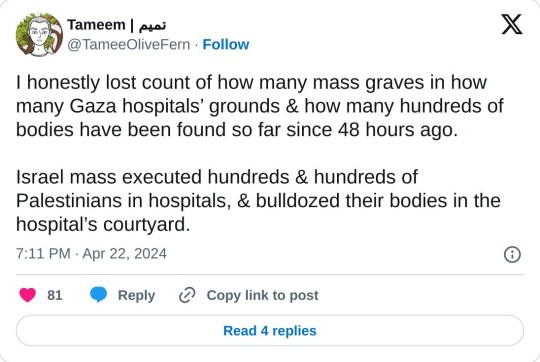
There are images of decomposed bodies wearing what appear to be scrubs... with their hands tied. Meaning they were executed while bound. I will not be sharing them because I'm tired of showing our martyrs' bodies to people.
15K notes
·
View notes
Text
Hello guys i have good news and bad news.
The good news that I'm finally in Egypt now with my youngest brother and the bad news is my mother and my other brother with his wife still in Rafah waiting to evacute to Egypt.
I feel so sad and depressed for leaving them i should stayed and get out together.
10K notes
·
View notes
Text
Hundreds of people are about to board a flotilla and deliver urgent humanitarian relief to Gaza. Please share this video and follow Gaza Freedom Flotilla. The more people watching, the safer the participants.
7K notes
·
View notes
Text
government is trying to ban tiktok meanwhile millions of poor and disabled americans are about to completely lose their internet access at the end of april because congress wont renew funding for the affordable connectivity program
hell fucking world
78K notes
·
View notes
Text

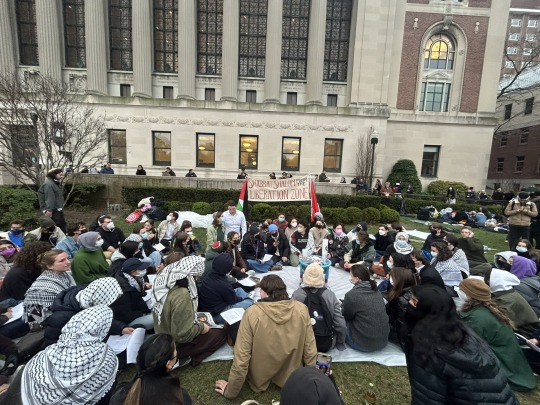
Gorgeous gorgeous Jewish students say free Palestine
5K notes
·
View notes
Text
the usa is leaving me to die slowly and painfully because i am poor please god rb this dont just like and scroll
i'm on a medication that is barely helping and i'm still having seizures almost every other day. finally had a grand mal the other day and i'm still hurting from it.
i don't have health insurance but i have to see a neurologist otherwise my condition is going to continue to deteriorate until it kills me if nothing is done
please. please it's alot but if 500 people send 10 bucks that meets our goal. anything at all helps. im begging for my life here it has to happen. i'm scared of going to sleep & i can barely do anything anymore even if i want to this is a fucking shitty way to go im only 24
5K notes
·
View notes
Text
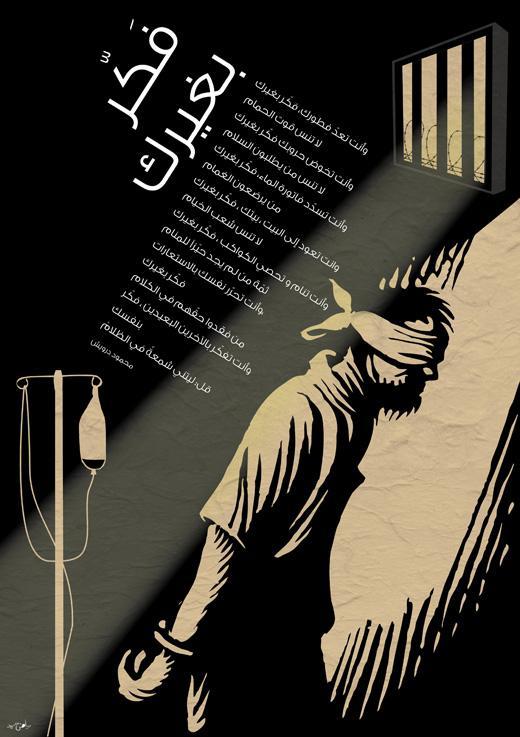
2012 poster by Riyad Hamad with Mahmoud Darwish's poem "Think of Others," bringing attention to the Palestinian prisoners' struggle, and particularly the Zionist regime's deliberate medical neglect of sick and disabled Palestinians held hostage in its prisons.
[ID: Illustration in a linocut style printed in black on beige paper, showing a Palestinian prisoner blindfolded with his hands cuffed behind his back. He stands in the light from a small barred window with barbed wire beyond it. Behind him is an IV dispenser, the bag is nearly empty. The Arabic text of the poem is printed at an angle in the dark space. /end ID]
342 notes
·
View notes
Text
Also re:necropolitics of israel (click)
A few days ago there were reports of Israeli soldiers "returning" bodies of martyrs they took like just straight up from Gaza. Here is a report about bodies being stolen from al-Shifa (click).
The director of Al-Shifa had reported the bodies being stolen back in November (click) before his arrest. The hospital workers mentioned not knowing why the soldiers would do that. The speculation of the photo-op arose because the photo-op of October 7th within Israel happened a month and a half after October 7th, after the Al-Shifa raid. People (Palestinians) noted that the level of violence done to the bodies seemed similar to what they had been seeing with the bombs in Gaza, and found it hard to believe that Hamas could inflict that much damage. There was a thread that was examining this idea but I haven't found it as it's been a bit. If I find it, I'll comment on this post.
But even then, Israel routinely makes corpses serve out their sentences or even outright steals them for the sake of enacting psychological torture onto the relatives of the martyr (click). The burial process is an essential step in mourning and grief, which means by withholding the bodies, they ensure that the family is unable to recover emotionally from the death of their loved one nor are they allowed to move on. This is essentially a form of ensuring that people are unable to resist as the emotional toll this takes on them is quite high.
A variety of reports and testimonies are linked in this article regarding the harvesting and removal of organs throughout the years by Israel (click). The most damning of the evidence is a testimony by Dr. Meira Weiss in her book "Over Their Dead Bodies." The article has a translated passage from Hebrew about the period at the turn of the century and their practices then (roughly 1996-2002):
“They would take corneas, skin, and heart valves, while noting that non-professionals would not notice the absence of these organs as they would place something plastic in place of the corneas and ‘take’ the skin from the back so that the family wouldn’t see it. In addition, the bodies of detained martyrs are used in medical colleges at Israeli universities for research purposes.” Weiss confirmed that “in the first Intifada, the army effectively allowed the institute to extract organs from Palestinians under a military procedure that required the autopsy of a Palestinian prisoner. The autopsy procedure was accompanied by organ removal, which was used by the Israeli Skin Bank established in 1985 to treat burns suffered by Israeli soldiers. This was after the Chief Rabbinate Council issued a ruling legitimizing it, which led to saving the lives of many Israelis who were injured during attacks on Palestinian citizens, continuous assaults, and wars — at the expense of Palestinian martyrs, according to specialized Israeli medical sources for burn treatment.”
It's worthy to note: as an occupying force especially, Israel should not be doing ANYTHING with these bodies and just returning them to the families. I've seen some people say "they didn't JUST harvest Palestinians' organs, they also harvested Israeli organs." It doesn't matter. They are an occupying force that enacts systematic violence on Palestinians especially and within this context, anything Israel does towards Palestinians is a targeted, racialized violence. It is widely known that Israel denies crimes it has committed until many, many years, especially from during the Nakba, such as well poisoning.
People provide evidence that organs can't be used after a certain point in time.... in this context (October 2023-December 2023), it's not about whether or not the organs were used for anything. It is specifically for the purpose of body desecration which Israeli soldiers especially have not been shy about. Here is a report during the bulldozer massacre in which people report that Israeli soldiers run over bodies for no other reason than desecration (click).
Also, remember the grave desecration that happened a few days ago? It was reported that they had stolen bodies believed to belong to young Palestinian activists then (click). This is widely known as 'necroviolence' on Palestinian bodies in order to humiliate them (click).
You cannot remove the context of an oppressive force (Israel) that is documented to have disrespected graves and bodies. You must analyze it within this context, not any others. Withholding bodies of Palestinians, no matter what they did while they were alive, is a form of disrespect and oppression on a subjugated population. To deny that this happens and to attribute it to antisemitism is not only disrespectful of Palestinians' mourning rights, but also an effort to remold the narrative into one of "Jewish people against Palestinians" by emphasizing the Jewishness of the occupying force rather than focusing on... you know... the fact that they're an occupying force known to enact violence on Palestinian martyrs.
2K notes
·
View notes
Text
Is Israeli academia about to enter a whole new phase? All signs are that it already has. In the past few weeks, Haaretz spoke with more than 60 Israeli scholars from a wide range of disciplines and academic institutions, from young scientists and university presidents about their experiences with colleagues abroad since the war broke out in the Gaza Strip after Hamas' massacre on October 7.
They recounted dozens of incidents: cancellation of invitations to conferences, a freeze on their appointments in foreign institutions, rejection of scientific articles on political grounds, disruption of lectures abroad, cessation of collaborative efforts with colleagues abroad, refusal by such colleagues to take part in the promotion process their Israeli counterparts must undergo at local institutions, and even a sweeping boycott of local colleges and universities. The following examples, all from recent months and backed up by documents and emails, are being made public here for the first time. The plethora of events leaves no room for doubt: Israel is feeling the brunt of an unprecedented academic boycott, which is only gathering momentum.
…
It once seemed as if the social sciences and humanities are more vulnerable to political struggles. Indeed, such departments in Israel were familiar with the impact of the boycott, divestment and sanctions movement long before October 7. However, the cessation of collaboration – whether in conducting research, co-authoring articles or in other areas – is now being seen as a widespread phenomenon in all fields.
A few months ago, Nir Davidson, a physics professor at the Weizmann Institute of Science, suggested to an Italian colleague that they try together to request a grant from a competitive research foundation. "Because of the atrocities your country is perpetrating against innocent civilians, thousands of professors and researchers have signed a petition calling for all research collaboration to be blocked," the colleague replied, noting that he "fondly recalls" a visit he made to Israel in 2020, but adding, "I'm afraid that what your country has done and is continuing to do will never be forgotten or forgiven."
About a month ago, a scientist from Ben-Gurion University of the Negev was ejected from an international group that submits research proposals to the European Union in the realm of environmental studies. The explanation he was given by one of his colleagues was, "I'm really sorry, but I'm going to have to not select Israel as a partner for the project. In fact, some partners do not wish to be involved in the project if Israel is a partner, particularly given the current political context. I am truly sorry, and I hope that we will have the opportunity to work together on another research project. Thank you for your understanding and I wish you all the best for the future."
…
"I am writing to let you know that I have decided to step down from the Ph.D. committee [reviewing a student's thesis]," a foreign social sciences scholar wrote the Hebrew University recently. "Following the university's recent declaration of commitment to Zionism in the context of the war that is raging in Gaza, I feel I can no longer be associated with this institution. I have enjoyed working with you all and it is with a heavy heart that I am making this decision."
The "commitment to Zionism" the professor cited was part of the fierce public condemnation the university issued against sharp remarks by Israeli-Palestinian Prof. Shalhoub-Kevorkian, of its law faculty, against Israel's conduct in the war in Gaza. "As a proud Israeli, public, and Zionist institution," the university stated, it condemned her comments and suspended her, before reinstating her two weeks later.
The email from the foreign academic who asked to stop advising the Hebrew University doctoral student is only one example of an apparently growing phenomenon whereby scholars overseas no longer want to help prepare the next generation of lecturers and researchers at Israeli institutions: Sources at a few such institutions admit that they find it increasingly difficult to obtain the letters of evaluation from academics abroad that must be submitted in advance of discussions of staff promotions in Israel.
For the present, it looks as though the latter trend is particularly noticeable in the social sciences and the humanities: in sociology and anthropology, Middle Eastern studies and literature. But according to a source at one university, the field of law is also falling victim to such dwindling collaboration with foreign schools.
…
"If the Israeli government commits irrevocably to either a two-state (within 1967 borders) or one-state solution in which all Palestinians in both Israel and the occupied territories have equal rights to Israelis – I will be happy to engage with Israeli institutions," a senior researcher at a prestigious institution in Europe wrote recently, in response to a request to write an evaluation for an Israeli academic. "Until that day, no." Another European academic wrote: "I do not believe that this suffering of civilians can be justified and I believe that Israel is not acting in accordance with international human rights law. In light of that, I feel I cannot collaborate with any Israeli institution at the moment."
…
"The dam has burst," Drori declares now. "Talking about an academic boycott of scientists in Israel has become legitimate. It's a whole new world. We are in a very extreme situation, and I don't know whether and how it will be possible to reverse things. The boycott is severing our ability to be involved in the forefront of research. All scientific research that does not involve the international community is research that is less good. The severance from the world is suffocating us."
If the pool of international experts who are willing to cooperate with Israel does continue to shrink, Israeli academics will face discouraging alternatives: to approach less senior academics from less well-regarded universities (which, according to a knowledgeable source, is already happening in some cases), or to increase the proportion of assessments provided by local faculty – not a particularly palatable solution.
…
A number of universities and academic organizations in Belgium, Spain, Italy and Norway recently announced full boycotts or a suspension of ties with Israeli institutions until they receive clarifications with regard to topics ranging from the state of academic freedom on their campuses, to their moral, financial and material support for Israel's defense forces. For one, Ghent University recently requested such information from its counterpart in Haifa.
…
"The best-case scenario is that within a short time we will return to some sort of stability," says American studies professor Milette Shamir, vice president of Tel Aviv University and director of its international academic collaborations. "Our standing in the world will be rehabilitated and we will be able to return to the situation we were in, to very extensive international activity."
But Shamir acknowledges that she "doesn't know whether that scenario is realistic." Two weeks ago, she was in Australia to attend an academic fair at the University of Sydney. When she arrived, pro-Palestinian demonstrators shouted that Tel Aviv University shares in crimes against the Palestinians and that all collaborations with Israel should end.
"The worst-case scenario is that we are headed in the direction of South Africa [in the apartheid period]," she says, "with boycotts that keep mounting to the point of paralyzing the system. The result will be a mortal blow to Israeli academia. It will take on a provincial character and we will not be able to integrate into the forefront of the world's research."
— 'I Won't Work With You. You're Committing Genocide': Israeli Academia Faces an Unprecedented Global Boycott. Or Kashti, Haaretz, April 14 2024
#reblog#acadmeic boycott#from the river to the sea palestine will be free#boycott#protest#article#long post
6K notes
·
View notes
Text
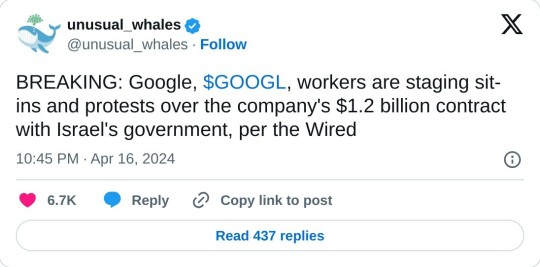
Dozens of Google employees began occupying company offices in New York City and Sunnyvale, California, on Tuesday in protest of the company’s $1.2 billion contract providing cloud computing services to the Israeli government.
The sit-in, organized by the activist group No Tech for Apartheid, is happening at Google Cloud CEO Thomas Kurian’s office in Sunnyvale and the 10th floor commons of Google’s New York office. The sit-in will be accompanied by outdoor protests at Google offices in New York, Sunnyvale, San Francisco, and Seattle beginning at 2 pm ET and 11 am PT.
Tuesday’s actions mark an escalation in a series of recent protests organized by tech workers who oppose their employer’s relationship with the Israeli government, especially in light of Israel’s ongoing assault on Gaza.
Just over a dozen people gathered outside Google’s offices in New York and Sunnyvale on Tuesday. Among those in New York was Google cloud software engineer Eddie Hatfield, who was fired days after disrupting Google Israel’s managing director at March’s Mind The Tech, a company-sponsored conference focused on the Israeli tech industry, in early March. Several hours into the sit-ins on Tuesday, Google security began to accuse the workers of “trespassing” and disrupting work, prompting several people to leave while others vowed to remain until they were forced out.
The 2021 contract, known as Project Nimbus, involves Google and Amazon jointly providing cloud computing infrastructure and services across branches of the Israeli government. Last week, Time reported that Google’s work on Project Nimbus involves providing direct services to the Israel Defense Forces. No Tech for Apartheid is a coalition of tech workers and organizers with MPower Change and Jewish Voice for Peace, which are respectively Muslim- and Jewish-led peace-focused activist organizations. The coalition came together shortly after Project Nimbus was signed and its details became public in 2021.
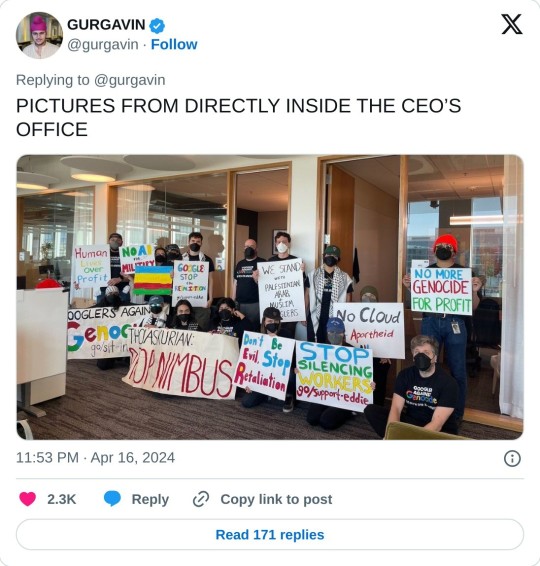
You can read No Tech for Apartheid's open letter here.
5K notes
·
View notes
Text
AMAZING article about what it means to participate in anti-Zionism work both online and in person.
If your anti-zionism does not in any way acknowledge that it is a way of thought and practice led by and for Palestinians, then you need to reevaluate your "anti-zionism" label.
Some passages that felt especially relevant to tumblr:
If we accept, as those with even the most rudimentary understanding of history do, that zionism is an ongoing process of settler-colonialism, then the undoing of zionism requires anti-zionism, which should be understood as a process of decolonisation. Anti-zionism as a decolonial ideology then becomes rightly situated as an indigenous liberation movement. The resulting implication is two-fold. First, decolonial organising requires that we extract ourselves from the limitations of existing structures of power and knowledge and imagine a new, just world. Second, this understanding clarifies that the caretakers of anti-zionist thought are indigenous communities resisting colonial erasure, and it is from this analysis that the strategies, modes, and goals of decolonial praxis should flow. In simpler terms: Palestinians committed to decolonisation, not Western-based NGOs, are the primary authors of anti-zionist thought. We write this as a Palestinian and a Palestinian-American who live and work in Palestine, and have seen the impact of so-called ‘Western values’ and how the centring of the ‘human rights’ paradigm disrupts real decolonial efforts in Palestine and abroad. This is carried out in favour of maintaining the status quo and gaining proximity to power, using our slogans emptied of Palestinian historical analysis.
Anti-zionist organising is not a new notion, but until now the use of the term in organising circles has been mired with misunderstandings, vague definitions, or minimised outright. Some have incorrectly described anti-zionism as amounting to activities or thought limited to critiques of the present Israeli government – this is a dangerous misrepresentation. Understanding anti-zionism as decolonisation requires the articulation of a political movement with material, articulated goals: the restitution of ancestral territories and upholding the inviolable principle of indigenous repatriation and through the right of return, coupled with the deconstruction of zionist structures and the reconstitution of governing frameworks that are conceived, directed, and implemented by Palestinians.
Anti-zionism illuminates the necessity to return power to the indigenous community and the need for frameworks of justice and accountability for the settler communities that have waged a bloody, unrelenting hundred-year war on the people of Palestine. It means that anti-zionism is much more than a slogan.
[...]
While our collective imaginations have not fully articulated what a liberated and decolonised Palestine looks like, the rough contours have been laid out repeatedly. Ask any Palestinian refugee displaced from Haifa, the lands of Sheikh Muwannis, or Deir Yassin – they will tell that a decolonised Palestine is, at a minimum, the right of Palestinians’ return to an autonomous political unit from the river to the sea.
When self-proclaimed ‘anti-zionists’ use rhetoric like ‘Israel-Palestine’ – or worse, ‘Palestine-Israel’ – we wonder: where do you think ‘Israel’ exists? On which land does it lay, if not Palestine? This is nothing more than an attempt to legitimise a colonial state; the name you are looking for is Palestine – no hyphen required. At a minimum, anti-zionist formations should cut out language that forces upon Palestinians and non-Palestinian allies the violence of colonial theft.
[...]
The common choice to centre the Oslo Accords, international humanitarian law, and the human rights paradigm over socio-historical Palestinian realities not only limits our analysis and political interventions; it restricts our imagination of what kind of future Palestinians deserve, sidelining questions of decolonization to convince us that it is the new, bad settlers in the West Bank who are the source of violence. Legitimate settlers, who reside within the bounds of Palestinian geographies stolen in 1948 like Tel Aviv and West Jerusalem, are different within this narrative. Like Breaking the Silence, they can be enlightened by learning the error of colonial violence carried out in service of the bad settlers. They can supposedly even be our solidarity partners – all without having to sacrifice a crumb of colonial privilege or denounce pre-1967 zionist violence in any of its cruel manifestations.
As a result of this course of thought, solidarity organisations often showcase particular Israelis – those who renounce state violence in service of the bad settlers and their ongoing colonisation of the West Bank – in roles as professionals and peacemakers, positioning them on an equal intellectual, moral, or class footing with Palestinians. There is no recognition of the inherent imbalance of power between these Israelis and the Palestinians they purport to be in solidarity with – stripping away their settler status. The settler is taken out of the historical-political context which afforded them privileged status on stolen land, and is given the power to delineate the Palestinian experience. This is part of the historical occlusion of the zionist narrative, overlooking the context of settler-colonialism to read the settler as an individual, and omitting their class status as a settler.
It is essential to note that Palestinians have never rejected Jewish indigeneity in Palestine. However, the liberation movement has differentiated between zionist settlers and Jewish natives. Palestinians have established a clear and rational framework for this distinction, like in the Thawabet, the National Charter of Palestine from 1968. Article 6 states, ‘The Jews who had normally resided in Palestine until the beginning of the Zionist invasion will be considered Palestinians.’
When individuals misread ‘decolonisation’ as ‘the mass killing or expulsion of Jews,’ it is often a reflection of their own entanglement in colonialism or a result of zionist propaganda. Perpetuating this rhetoric is a deliberate misinterpretation of Palestinian thought, which has maintained this position over a century of indigenous organising.
Even after 100 years of enduring ethnic cleansing, whole communities bombed and entire family lines erased, Palestinians have never, as a collective, called for the mass killing of Jews or Israelis. Anti-zionism cannot shy away from employing the historical-political definitions of ‘settler’ and ‘indigenous’ in their discourse to confront ahistorical readings of Palestinian decolonial thought and zionist propaganda.
[...]
In the context of the United States, the most threatening zionist institutions are the entrenched political parties which function to maintain the status quo of the American empire, not Hillel groups on university campuses or even Christian zionist churches. While the Anti-Defamation League (ADL) and the American Israel Public Affairs Committee (AIPAC) engage in forms of violence that suppress Palestinian liberation and must not be minimised, it is crucial to recognise that the most consequential institutions in the context of settler-colonialism are not exclusively Jewish in their orientation or representation: the Republican and Democratic Party in the United States do arguably more to manufacture public consent for the slaughtering of Palestinians than the ADL and AIPAC combined. Even the Progressive Caucus and the majority of ‘The Squad’ are guilty of this.
Leila Shomali and Lara Kilani
#to read#decolonisation#anti zionism#reblog#article#i already read this but i better make notes because otherwise i forget
2K notes
·
View notes
Text
Another fundraiser I trust!
He has a tumblr, and it seems he's very new to it and doesn't know how to use it properly so he ends up looking like a bot but dw he is legit. I had a long conversation with Mahmoud over DM's just to go over everything. It all checks out. Please consider donating to get his family out of Ghazzah! Additionally, his brother-in-law is special needs and cannot be taken care of in a tent!
5K notes
·
View notes
Text

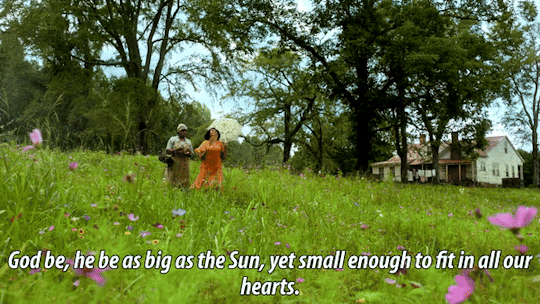
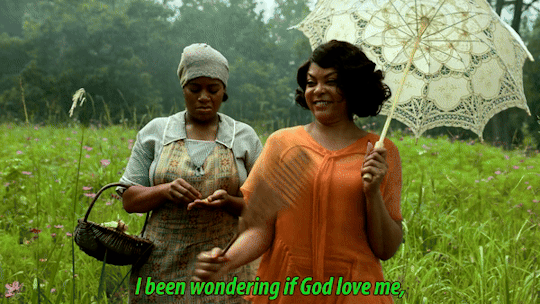

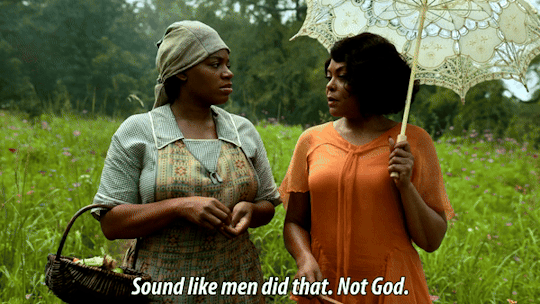

"You see, I think it pisses God off if you walk past the color purple and not notice it."
"You saying God wants to be loved like it say in the Bible?"
"Oh, everything and everybody wants to be loved. Especially God. That's why God be in everything. And see, when you love what God has made, you is loving God and God is loving you."
The Color Purple (2023) dir. Blitz Bazawule

439 notes
·
View notes
Text
REMINDER THAT APRIL 15TH IS A GLOBAL STRIKE DAY FOR GAZA
Don't stimulate the economy and participate on local action, the site below contains more info about the strike.
The strike is mostly in the US, but you can help regardless of country, you can also share info, boost posts in social media and put posters in your city about Gaza.
6K notes
·
View notes
Note
Can you elaborate more on how hindutva is tied to zionism and white supremacy? I'm not trying to hate I'm genuinely curious.
tbh i don’t have the energy rn to write up an explanation myself, but here are some sources to get you started:
hindutva’s ties to fascism, nazism, & white supremacy broadly
hindu fascism 101: what is hindutva?, by the alliance for justice & accountability
why white nationalists are working with hindu supremacists, by safa ahmed at progressive
why white supremacists and hindu nationalists are so alike, by audita chaudhery at al jazeera
white and hindu supremacists are a match made in heaven, by amardeep singh dhillion at novara media
when hindu nationalism and white nationalism meet, by thomas crowley at jacobin
hindutva & zionism specifically
united in hate: the similarities and solidarities between hindutva and zionism, by ananya ray at feminism in india
the hindu nationalists using the pro-israel playbook, by aparna gopalan at jewish currents
why zionism rules the hearts of hindutva acolytes, by shreevatsa navatia at frontline (a magazine of the hindu)
in state repression and its justification, india and israel have much in common, by achin vanaik at the wire
violent majorities: indian and israeli ethnonationalism, a discussion between balmurli natrajan, lori allen, and ajantha subramanian at recall this book podcast
how hindu nationalists became best friends with israel, by goldie osuri at jacobin
india's hindutva proponents and zionist israel: strange bedfellows, by kavita chowdhury at the diplomat
1K notes
·
View notes
Text
[ ID: A digital fanart of Knuckles from the video game franchise Sonic The Hedgehog. The digital art has a traditional look emulated to it, like it was sketched with pencil and painted. Here in the artists interpretation Knuckles is given a darker skin tone.
He wears a dress of Rarity's from the show MLP: FIM. He stands regally facing to the side and smiles, folding his hands forwards. He blushes a bit. The poofy gala dress is in shades of deeper pink, studded with gems, and adorned with yellow sashes. He also wears rings with jewels in his hair.
A swatch of the colors used is seen as well as the artists signature "hatsu". The BG is yellow. End ID]

Healing my inner child by drawing the Sonic character I associated with Rarity the most 🥺
#reblog#knuckles the echidna#THIS IS SO BEAUTIFUL FR#I LOVE HOW U DID HIS HAIR !!!#HES A PRETTY PRINCESSSS#THIS BRINGS ME JOY....#I LOVE YOUR ART HATSU#SO MUCH#ITS SO MAGICAL#THE FAINT PAINT SPLASHES AAAAA#I LOVE EVERY STROKE IN THIS#FAVE#sonic the hedgehog#fanart
70 notes
·
View notes